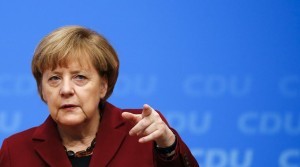German Chancellor Angela Merkel said on Wednesday the European Union was ready to start negotiating with Britain about its exit from the EU on June 19, as planned, despite surprising election losses for London’s governing Conservatives.
She said she assumed that the talks would proceed despite the setback for Prime Minister Theresa May’s Conservatives in the June 8 parliamentary election, in which her party lost its governing majority.
“We’re ready on the European side. We’ll see about the rest,” Merkel told reporters after a meeting with top government officials, unions and business leaders in Meseberg, a town in eastern Germany.
She declined to speculate about any change in Britain’s plans to withdraw from the EU following the election, saying, “The citizens have decided, and I assume that we will have to carry out these negotiations.”
May has said the divorce talks, likely to be the most complex in Europe since World War Two, would begin as planned next week and her Brexit minister, David Davis, said London’s negotiating position was unchanged.
But May’s predecessor, David Cameron, said there would be pressure after last week’s surprise for a “softer” Brexit that gave greater priority to a close trading deal with the EU.
Foreign Minister Sigmar Gabriel, echoing remarks by French President Emmanuel Macron, said the door to Europe remained open to Britain, and it was up to the British people whether they wanted to change their minds about leaving the EU.
“We all have an interest … in keeping them as close as possible to the European Union, because Britain is an important country, vital to the EU in the security and foreign policy realm, and naturally also a part of the European market,” he said.
Both Merkel and Gabriel said the EU would have to safeguard its own interests in the negotiations with Britain.
“The remaining 27 nations of the future European Union must represent our interests in a way that strengthens unity among the 27 and still maintains good relations with Britain,” Merkel told the joint news conference.
Gabriel said the drop in support for May’s Conservatives reflected dissatisfaction with the Brexit process. “There’s no benefit to messing with the interests of your population all too much,” he said.
source: reuters.com
Ask me anything
Explore related questions





